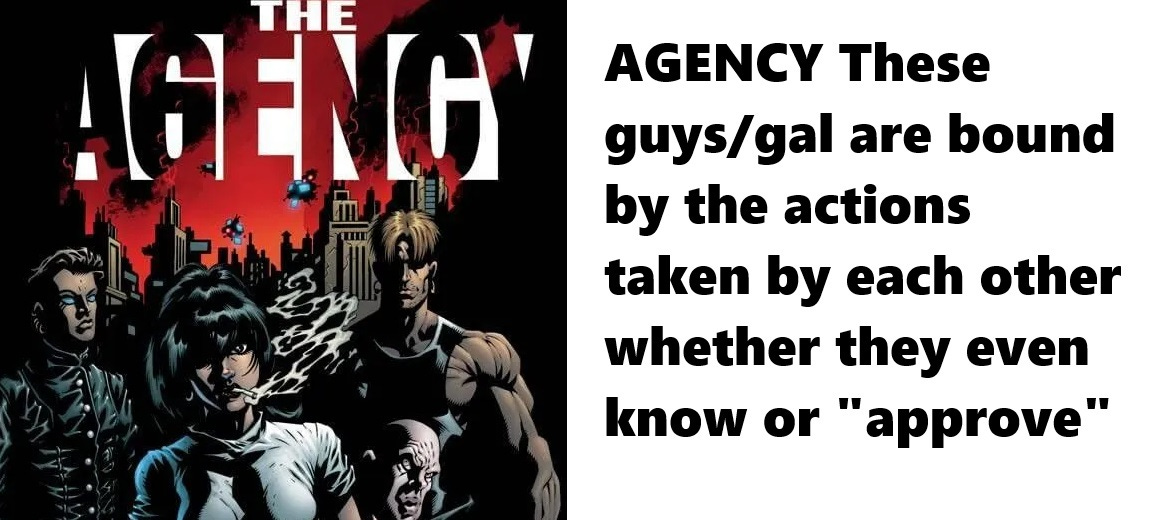[Today in content you will find nowhere else.]
“Agents” — don’t do it friends.
Your lawyer is talking to you. Tell a founder friend what you read here. Heck, tell a lawyer advising same!
No, not the technology. Agents are a rather remarkable AI tool which shows great promise and peril for what is effectively, “autonomous software.” Software which can do speak code listen click program access act — without you.
Agents are AI code which acts.
But here I mean the terminology. “Agent” Please listen to your AI Counsel, your General Counsel, for just a moment because like the digital agents which act, the word/term “agent” also acts…
Don’t. Use. That. Term.
Don’t.
REDLINE
In probably the most salient example of what I have been talking about; that words often have twin meanings - common language, and then also in “actional meaning” (technical nomenclature) what we call ‘terms of art’ in Law — these are words which are legal actions.
Actions?
Yes, actions?
Like a magic spell?
Sort of like a magic spell.
When you say them it creates a “legal reality” that did not exist except that you said it.
So, AI Counsel, what are you taking about — what is an “agent”?
PLEASE EXCUSE THE FOLLOWING DEPICTION OF LAW SUMMARY (I HAVE TO) PLEASE READ AS FOLLOWS - ALSO IM NOT YELLING ALL CAPS I AM EMPHASIZING!
Basic Summary of Agency Law Under Common Law
Agency law under common law governs the relationship between a principal and an agent, where the agent is AUTHORIZED to ACT on behalf of the principal to CREATE legal relationships with third parties.
Definition and Creation
Definition: Agency is a FIDUCIARY relationship in which the agent acts under the control and ON BEHALF OF the principal. This relationship can be created through express agreement, implied conduct, or apparent authority
Consent: Both the principal and agent must consent to the relationship, either explicitly (e.g., contracts) or implicitly THROUGH THEIR ACTIONS (“IMPLIED” CONSENT).
Types of Agency:
Express Agency: Created by direct AGREEMENT (written or verbal).
Implied Agency: Arises from CIRCUMSTANCE or CONDUCT.
Apparent Authority: Exists when a third party REASONABLE BELIEVES believes an agency relationship exists based on the principal's WORDS or actions
Authority of Agents
Types of Authority:
Actual Authority: Explicitly granted by the principal.
Implied Authority: Inferred from circumstances or conduct.
Apparent Authority: THIRD PARTIES reasonably BELIEVE THE AGENT has authority due to the principal's actions
Liability in Agency
THE PRINCIPAL IS GENERALLY LIABLE FOR ACTIONS UNDERTAKEN BY AGENT WITHIN THE SCOPE OF THEIR AUTHORITY.
THIRD PARTIES MAY HOLD PRINCIPALS ACCOUNTABLE FOR AGENTS’ ACTIONS UNDER APPARENT AUTHORITY IF THEY REASONABLY RELIED ON IT.
Agency is the binding legal authority of an organization.
Agency is the binding legal authority of a person.
It can be express (written down). It can be implied (what they said, what they did). It can be there even when you don’t want it there if the circumstances demonstrate it to be “reasonable.”
AN AGENT CAN LEGALLY BIND A COMPANY.
AN AGENT CAN LEGALLY BIND A COMPANY.
AN AGENT CAN LEGALLY BIND A COMPANY.
Why on God’s green earth would you name an automated software (that takes actions unknown and unexpected, that you can control and not control, that you may want and you may not want) an “agent?”
Foolhearty mis-use of a legal term of art which is going to get a lot of people in trouble.
[As I have written before, LAWMIND is required in AI because there are real LEGAL RAMIFICATIONS. Calling these things “agents” (while clever and maybe even accurate) was certainly the work of a code developer (i.e. “I am technical”) mind w/o reference to legal principles, terms, and understanding.]
“You messed up my site, Microsoft, with one of your agents, I’m SUING YOU FOR 10M!“
“It was not us, it was some user using our tool.”
“No. It says it right there ‘Microsoft Agent’, it led me to believe it had either the ACTUAL IMPLIED or APPARENT authority of Microsoft. It is in fact Microsoft Corp’s ‘Agent’ it acted on behalf of you and with your instructions.”
“No, it didn’t. Just because it’s called that it does not matter. And it’s ‘just digital’ its not even a PERSON!”
[Plaintiffs-side attorney] “Ok. Tell it to the judge. We can talk about it in court and in Discovery. I have all these public statements of your CEO saying YOU made something that performs actions on behalf of your company and the user. Agency law is pretty clear and wide (actual, implied, apparent) and you are welcome to make your arguments. But you are the one who created the tool which messed my client’s stuff…..and you are the one to call it an AGENT! I’m wrong to call it an agent?”
»»»»>Related, you cannot also be sure that YOU YOURSELF will not be legally imperiled if a piece of software named “Joe’s Agent” does some harm. In fact if the harm is large enough, you should expect it. I and many other attorneys would readily bring a case about someone causing harm “through their agent.”
Friends, don’t let friends use the term “agent” for automated AI software. Hear me today and believe me tomorrow.
Agent is a “magic (legal) term” which means you authorized it.
So what to call it instead? Here are 3 ideas I have…
Softbot (software bot) - this gives constructive notice that we are talking about a (presumed sometimes buggy and unpredictable) piece of code instead of something you created attached to you/your company working on your behalf
Autobot (automated bot) - for the same reasons, it is automated which gives notice to the world (since most of us know) that it can make error and the actor/interactor assumes some legal of risk
DOA “Dynamic Operation AI” (D-AI) - this would be a great one from a risk disclosure perspective, I like the sound of it overall and no one could not say they were not warned! The DAI contrasts/related well with OAI, this is something in operation with the same eccentricities one would expect from ChatGPT (e.g.).
Have a wonderful day and let’s keep our agents close, and our implied agents even closer!








Totally agree with your take, I see a lot of founders promoting their AI agents and although is great branding, they ignore (maybe in a clueless way) the legal repercussions of the actions that an agent has.
here are three
Winter ‘24 with AI Rebels
https://open.spotify.com/episode/1pgZ9vLHZzvhvaSQsCV7e5
Spring ‘24 with Futuristic Lawyer (Denmark)
https://www.youtube.com/watch?v=v6cfWG3nevA
Winter/Spring ‘24 with FuturAi (UK) and Pranath Fernando
https://www.thefuturai.net/p/episode-2-cyrus-johnson-ais-disruption-70b
think another one is coming out this week
you can click on Podcast on top of my blog to find originals/solos on various topics
thank you for your interest Pedro!